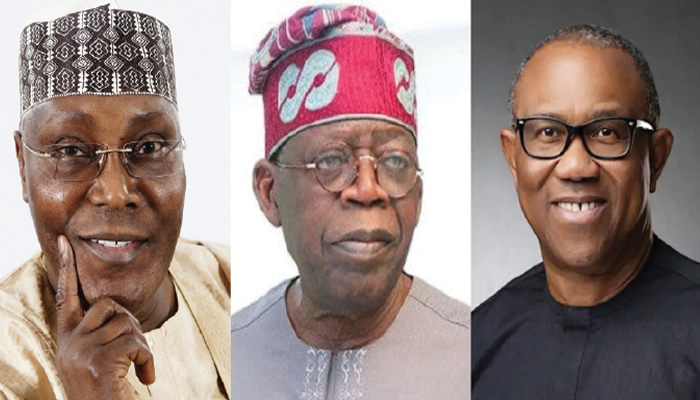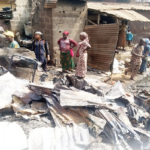
Ahead of the 2023 general election, DIRISU YAKUBU examines the penchant for smear campaigns by politicians who deliberately abandon issues affecting the country and how to tackle them
Harold Laswell perhaps had Nigeria in mind when he defined politics as war without bloodshed. With a little over a month to the February 25 presidential election, candidates of the major parties have continued to tour the states of the federation, seeking votes and sharing their dreams of a new Nigeria with the electorate.
In advanced democracies, campaigns provide resource materials for students of Political Science and Public Administration as gladiators take trips down memory lane to woo their audience with rich history centred on characters both living and dead. It is not for any other reason that knowledge seeking youths and adults often seat glued to their seats during the presidential electioneering campaigns of the United States of America.
However, campaign rallies, ordinarily aimed at mass mobilisation ahead of elections, are fast becoming avenues for personal attacks and names calling in this part of the world. Candidates, who, in the past, occupied prominent positions, are now throwing caution to the wind as they go after one another’s jugular, dishing out invectives that will leave their children ashamed.
In October last year, presidential candidate of the Peoples Democratic Party, Alhaji Atiku Abubakar, took a swipe at his All Progressives Congress counterpart, Bola Tinubu, in a reaction to the latter’s earlier verbal attack.
The former governor of Lagos State had mocked Atiku’s penchant for jetting out to Dubai, and urged Nigerians not to elect a man who won’t be home to tackle frontally issues affecting the health of the nation.
Not one to let the opportunity pass away, the former Vice President, in a statement issued by his media adviser, Paul Ibe, took Tinubu to the cleaners and questioned the former governor’s parentage, education, among others.
“Nobody should take the candidate of that party (APC) seriously. No one should take a candidate and a party whose health situation, early school, and early years are all shrouded in secrecy. No one should take such a candidate seriously, Atiku said in a statement in October, 2022.
Few months later, Atiku again hit at Tinubu a day after he spoke to a global audience at the Chatham House, London.
“Six long months after emerging as the candidate of the party, the self-styled Lagos godfather has continued to avoid any public engagement with other candidates because his intelligence pales in comparison to them. The Chatham House event was therefore an opportunity to redeem himself, but once again, he fell short.
“After reading his prepared speech for about 15 minutes, it was time for the question and answer session. Clearly lacking the capacity to respond to easy questions, he claimed his style is to delegate and thereafter decided to call on members of his campaign to answer questions for him,” Atiku said in a statement issued by Phrank Shaibu, his Special Assistant on Public Communication.
Speaking in Akure, the Ondo State capital, Tinubu in a bare-knuckled manner, spared no thought for diplomacy as he urged Nigerians to reject Atiku and Peter Obi, the candidate of the Labour Party at the February 25 presidential election.
Hear him on Atiku, “He doesn’t want to do the brave and hard work required to build a better nation. Instead, he would rather sell your birthright to the highest bidder and run off with the proceeds. He cares little that his policies and actions will impoverish you and leave you with nothing.”
On Obi, Tinubu said, “All he could do was to boast that he saved money. But I tell you that it is a wicked parent that holds money in his hand and yet allows his children to starve. Likewise, it is a heartless governor who holds back money when people go hungry, schools, roads and clinics go into disrepair. Neither the city-dweller nor farmer prospered under him.
My people, you cannot entrust your future or that of our nation to Mr Sell Everything Atiku or Mr Stingy Obi.”
Although seen largely as a man of little words, Peter Obi has also joined the train of reckless talkers at campaign rallies, given his recent outing in the university town of Nsukka. Surrounded by his old schoolmates recently, Obi told a crowd of supporters, “This country is sick and should not be handed over to a sick person. I am not saying that anyone is sick. We have been here for over two hours. We don’t want people who can’t stand for 30 minutes.” Although Obi mentioned no names, Nigerians at home and in the Diaspora knew who he had in mind.
So, what is responsible for this show of shame? Why is the call to focus on issue-based campaigns being neglected by the political players at the national and sub-national levels? Why have political parties been more interested in soiling the personalities of their opponents but deliberately fail to sell their programme to the electorate?
The best Nigerians must have heard many of the candidates say is that he will turn around the country’s economy, improve education, healthcare, agriculture and ensure security of lives and property, but none of them has been able to explain how he intends to achieve such lofty ideas.
Speaking exclusively with our correspondent, Joe Okei-Odumakin, President of Women Arise, said the campaigns had been nothing to write home about. She observed that most of the politicians have been pretentious in almost everything in order to sway the minds of unsuspecting Nigerians.
“We are a pretentious lot. That’s why we search for things we didn’t keep. Our campaigns have mostly always been about outfits- the one suitable for each ethnic area. It has been about suitable traditional music and dancing, about crafting abuses in traditional/religious lyrics. It has always been the sound of culture overwhelming the scanty presence of issues.
“The last time anyone did issues was in the era of MKO Abiola. People will dish out invectives against one another because it is easier than marshalling points. No one could give what he/she doesn’t have or what you have but without the means to bring it out. Venezuela has the largest oil deposit in the world but it is not among the largest oil producers in the world. It is among the poorest nations in the world,” she said.
Agreeing with Okei-Odumakin, the Executive Director, Civil Society Legislative Advocacy Centre, Ibrahim Rafsajani, said the nation’s democracy was wobbling because its very ethos were on the wane.
He said, “Democracy is believed to be the best system of governance globally and the cardinal principles that true democracy is established upon has to do with respecting the rights of the citizens living in a given society or country.
“In an ideal democratic setting, the major issues in governance that concern the citizens are debated upon by political candidates vying for elective offices so that the citizens can make their conclusions as to whom to cast their votes for based on the issues that such candidates address that will likely improve the overall welfare of the citizens.
“Hence, political candidates make promises as to how effectively their administration can address the major issues concerning the citizens, the nation and how such can directly affect the lives of the citizens through the delivery of basic goods and services by that candidate when he or she finally emerges victorious.
“Unfortunately, in Nigeria, democracy is supposed to be a role model for the African continent, but what we have is the opposite of these universally accepted ideals and principles of democracy. We operate a democratic system that focuses more on how to produce looters, leaders who are not accountable and transparent through vote-buying and commercialisation of political processes. This is why the only dominant issue is ruining the reputation of the other candidate through personal attacks and character assassination instead of focusing on the actual issues that concern the citizens.
“This sends a strong message to all and sundry that these candidates are not after improving the welfare of the citizens and creating or improving the image of our country. They are only after what they can say or do to destroy their opponents in the eyes of the voters so that they can get their way into the office.”
Also speaking, a member of the House of Representatives, Richard Agbo, described the personal attacks by the candidates as a function of bitterness and personal ego. In his words, “Politics of bitterness and ego played by desperate individuals who accidentally found themselves in politics to amass wealth to the detriment of our people and nation is what we are seeing today.
“Nigeria’s best are not in politics. The reason has its root in the military transition. When General Abdulsalami Abubakar took over in 1998 and mid-wifed a transition programme to civil rule, many credible members of the elite with the 3Cs (character, competence/capacity and courage) never believed that Abdulsalami would be faithful.
“They thought, like Generals Ibrahim Babangida and Sani Abacha, he wouldn’t hand over to civilians. So, the credible ones “siddon de look” but Abdulsalami proved them wrong. The resultant effect was that we saw a deluge of criminals, animals in human skins, scallywags, carpetbaggers, ex-convicts and armed robbers dominating the political landscape, thereby mainstreaming a criminal enterprise in the polity.
“Most of the politicians seeking elective offices are super wealthy. So, they believe money is everything and this intoxicates them so much that they attack personalities instead of addressing issues,” Agbo said.
Joining the conversation, Mike Ozekhome, a Senior Advocate of Nigeria said politicians ditching issue-based campaigns for personal attacks have no solution to Nigeria’s challenges.
“It (personal attacks) is diversionary, crude, undemocratic and brazenly insensitive and insensate to the urgent needs of a collapsing nation that is barely on oxygen support. It is shameful and immoral.
“Let the candidates pinpoint from their manifestos how the nation can be redeemed from her straight-jacketed state of the nadir; how they can midwife a new people-driven constitution written after a popular referendum that will enjoy the people’s legitimacy, credibility and acceptability, as against the present militarily-imposed constitution which is actually a schedule attached to Decree 24 of 1999.
“Let them tell us how to escape the present haemorrhaging budget of N21tn out of which only N9tn is from expected revenue while the remaining 12 trillion is borrowed,” he said.
Similarly, the Chancellor of the International Society for social Justice and Human Rights, Chief Jackson Omenazu, said it was surprising that almost all the candidates had engaged in mudslinging rather telling the electorate how they would tackle the myriad of challenges facing the country.
He urged the politicians to consider that the 2023 election and the performance of the next president will determine if the country will move forward or collapse.
He said, “The smear campaigns and the deliberate avoidance of issues that can solve the country’s problems are signs of people who don’t want to engage the populace in a positive campaign. It is really very bad. That’s why we are really underdeveloped. You can see what is playing out; they engage in attacking their opponents instead of attacking the reasons of our poverty, instead of telling us how we will get out of poverty.
“Look at Nigeria today; we have been running a mono-economy for over 60 years, yet the political class thinks it is normal. Nigeria tourism potentials alone can give us the whole amount petroleum is giving us, but nobody talks about that. Those who want to lead us in the next administration are busy talking nonsense. We are busy looking at non-issues instead of looking at issues. Nobody has told us categorically how insecurity in Nigeria will be eradicated finally. Nobody is telling us how the industries will be revived. Nobody has come up with a blueprint on how foreign investment will return to Nigeria.
“In this country, the political class who wants to lead this country has not explained to us why we should have over 10 million out-of-school children. So, you can see that we are still back to square one. We don’t have a political class who are so patriotic to say enough is enough; let us go back to where we are before where a dollar is N140. So, they have come again to cajole the innocent citizens of this country. That is why they are happy when the number of illiterates is ten times higher than the numbers of literate persons.”





